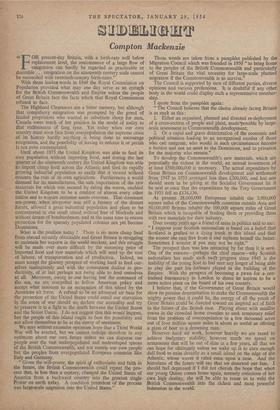• • • •
• THE ATOM
• • • • • •
• • •by GORDON DEAN
• Chairman, United States Atomic • Energy Commission, 1950-1953
• Demy 8vo 288 pages i6 pages of illustrations 16s. net • Of this exciting and authoritative account of the pro- • gress made in atomic research throughout the world • SIR JOHN COCKROFT • writes :— • • " Mr. Gordon Dean' has held for four years the most • important position in the Atomic Energy world of today. • His book can be commended as an objective and • • authoritative statement," • and • Professor J. ROBERT OPPENHEEVIER : • • " This is atomic age. Mr. Dean has done much to • • bring it to maturity. In this book he has written a • large part of its story."
• " No important conclusion or argument or impression • is based on error of fact, in this respect the book is • unique and welcome . . . a model of clarity and of • A lively travel book • • APES AND- IVORY • 412 pages Illustrated 21s. net • • " One's chief impression of Africa is a country of • rich variety, colourful, vivid and of infinite texture... • This book is a sensitive and most ably written record of • • time well spent in a fascinating continent." SPECTATOR • "It catches the burning colours, the heady scents of • • Africa." DAILY TELEGRAPH by JOY PACKER
•
• • • • • • • • • • •
• • • • • . • • • • • • • • • • • • • • • • • • • • • • • • • • • • • • • • • • • • • • • • • . • • • • • • • •
Companionship could make the dream real for a time, but not always. The best escapes were into other dreams. We were allowed into cinemas twice a term, and when we had enough money, we bicycled as far away from the school as we could for secret extra visits, but we hardly ever had enough money. Books were easier come by. Not our school books— we were taught by a system of individual assignments, so much work to be got through each month. Because time was not real for me, I never did the work (a month, I thought, will never end) until it was suddenly too late, and a mountain, an impossible mountain had piled up on top of me. The school library was at first a safe place. Full of friendly smells, warm and quiet. I read the first books that came to my hand—a life of Disraeli, Evelina, and a wonder-book of deep-sea diving. Everything I read I forgot instantly; it was only an escape for a time, and had no link with anything I really knew about. After a time the librarian noticed me too much. I took too many books out at a time, and didn't put them back; she knew I didn't do my school work, and asked me why I was idling. So the library wasn't safe any more. There was, however, a lending library in the town. For twopence, cheaper than any cinema, I borrowed books by Dennis Wheatley and Ian Hay, and read them inside hedges and deserted classrooms—safe from any questioning. - The. girl I shared a dormitory with bought True Confessions and hid it under her mattress—so did I—and here was another world, moved like my own by dark, obscure motives, but like Disraeli and the deep-sea diving it faded when I stopped reading. I had a bicycle, and as I grew older rode out on it on the flat land round the school. The towns were growing, and in most of the new housing estates there was one house furnished by the house agents, and sometimes even fitted with dummies —parents sitting on the mock leather armchairs in the lounge and children asleep in the bedroom upstairs. The quiet care- takers saw no reason to stop me prowling round, touching, but quite uncritical of the furniture, colours and pictures. The school thought that the answer for stupid, maladjusted children was creative work. Next door there was a witch's house. Under Gothic archways in dark rooms there were recorders and flutes, hand-weaving looms, clay pots, and a little old lady with jangling chains round her neck and a terrifying voice and eyes. Her garden, as I remember it, had dark cypresses and a pond. The best way out of the school was by illness. At the end of my second year I was spending one week in three in bed. There was nothing very much wrong with me except slight malnutrition—I refused to eat cheese, the main protein at a vegetarian school—but I treasured and encouraged every cold and cough, that I had. I chewed grass from the school field, hoping it would make me sick, and spread blotting paper in my shoes when someone told me that it made you faint. Perhaps I used the wrong blotting paper. Once in bed, there was very little the school nurses could do to move me. I lay for hours and hours, half- asleep, curled up, and out of the bad dream.


















































 Previous page
Previous page